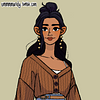Take a photo of a barcode or cover
I will give Rooney her laurels for two things. The first being that I can understand why people are drawn to her books. She does a good job of fleshing out her character’s thoughts and really showing you their perfections of reality - especially the parts that make them aggravating. I can tell that she understands to some degree the capacity for human psychology, multiplicity of thought, and the miscommunication that happens in all human connections. The second thing is that Rooney does a good job of demonstrating how pervasive patriarchal stereotypes and commodification of women occur, in an overt, brash, incel-labeled manner, and the insidious, internalized, gaslit, and pervasive manners.
I don’t find these writing chops enough to overcome the multitude of sins Rooney commits in her writing. If this novel is anything to go by, they are so painfully male centric. While the two brothers are foils to each other in how they process grief (which is the red herring of this book by the way), they are foils to demonstrate how men poorly treat women. One brother, Ivan, self labels as an incel, but it’s because he didn’t know any better and was simply testing out world philosophies until he got older. One brother, Peter, is a self labeled human rights activists who champions women’s rights and yet puts himself in a deceitful love triangle that nearly ruins the lives of two good women as collateral.
The novel continually portrays women as the rehabilitation homes for these men and their dysfunctional lives and dysfunctional processing skills. These women are physically and emotionally battered from their own complex lives and yet they are the ones providing therapy, emotional processing, love, sex, and other needs meeting for these two pathetic men. These women could each have such rich lives but instead are reduced to flat, inanimate objects, used only to gratify each brother’s lust or need for emotional soothing. I nearly quit reading this book so many times after reading another onslaught of one of these women being vulnerable and these men preying on their emotional abilities to unwind their traumas.
Another element I absolutely detested was the implicit nodding Rooney was doing in making Ivan a neurodivergent character. First off, I think it quite frankly does nothing for the disability community to see a white, privileged, middle class , heterosexual man, who is a chess savant, be the representation of neurodivergence. Not only does it fall into so many unhelpful stereotypes, but Ivan’s atrocious behavior is often implicitly related to being a by product of his neurodivergence. I don’t think Rooney has the faintest clue of what she was trying to do with this character. I for one saw Ivan representing something else, not neurodivergence. He seems to me to be an example of a person with Borderline Personality Disorder. His character is someone who thinks purely in black and white, who does a lot of splitting (a rationalization in which things or a person are completely good or completely evil), and latches onto a romantic partner immediately and shows a disproportionate emotional attachment to them (sometimes called a “favorite person”). This is not all the issues that people with BPD face and it’s possible that Rooney wasn’t even trying to bring about this correlation. But to me, I see more character traits and thought patterns reminiscent of a personality disorder than neurodivergence in Ivan. And I could do the same analysis for Peter as well (especially with his penchant for violence, emotional gaslighting, and quick devolution into self harm).
In all, while this book has some interesting passages, there are some glaring issues, namely the way in which Rooney writes her women characters. Which is quite alarming to me considering the fact that her readership base is female. She’s basically glorifying a woman’s suffering and emotional abuse in a relationship all for the point of rehabilitating men who are too weak, too shallow, too selfish, and too self possessed? It’s as if you’re stargazing into a puddle. That’s all I could see in this book. And after reading it, I think I’ve seen all that I want to see about Rooney’s works. I prefer my authors and their works to decenter men fully.
Graphic: Alcoholism, Cancer, Death, Drug abuse, Drug use, Emotional abuse, Mental illness, Misogyny, Panic attacks/disorders, Self harm, Sexism, Sexual content, Suicidal thoughts, Terminal illness, Toxic relationship, Medical content, Grief, Suicide attempt, Death of parent, Gaslighting, Toxic friendship, Alcohol
Moderate: Ableism, Addiction, Adult/minor relationship, Homophobia, Infidelity, Blood
Graphic: Sexual content, Suicidal thoughts
Moderate: Addiction, Alcoholism, Medical content, Grief, Death of parent
Moderate: Alcoholism, Cancer, Suicidal thoughts, Grief, Death of parent
Minor: Violence, Medical content, Car accident
It might be my favourite Sally Rooney novel yet, which I would not have expected when I first opened the book, and had to reread the first few pages several times!
The sheer depth to which she writes these characters and their lives is insurmountable. They are flawed, philosophical, complex human beings who reflect the world around them (and the reader!).
The way Rooney writes has become even more sophisticated since BWWAY. I think the previous book was a necessary transition from the tremendous normal people and has enabled her to get to this point. The weaving of perspective, dialogue and tone is magic.
Graphic: Cancer, Chronic illness, Drug abuse, Drug use, Mental illness, Sexual content, Suicidal thoughts, Terminal illness, Violence, Blood, Vomit, Police brutality, Medical content, Grief, Death of parent, Alcohol
"The demands of other people do not dissolve; they only multiply. More and more complex, more difficult. Which is another way, she thinks, of saying: more life, more and more of life."
Graphic: Chronic illness, Grief, Death of parent
Moderate: Cancer, Mental illness, Sexual content, Suicidal thoughts, Terminal illness
Minor: Drug use, Misogyny, Vomit, Medical content, Alcohol, Classism
Graphic: Suicidal thoughts, Grief
Moderate: Alcoholism, Sexual content, Violence, Alcohol
Minor: Medical content, Death of parent, Injury/Injury detail
This book covers a lot about grief, and loneliness and the complicated nature of love. It basically illustrates what happens when an entire family doesn't believe in therapy or communication, so you watch a lot of toxic self-soothing and mommy issues playing out.
You'll like this if you have similar family dynamics, and like experiencing unstable narrators finding their way to redemption. Lots of TWs.
Graphic: Addiction, Alcoholism, Animal cruelty, Cancer, Drug use, Emotional abuse, Misogyny, Sexual content, Suicidal thoughts, Toxic relationship, Blood, Vomit, Medical content, Grief, Death of parent, Abandonment, Alcohol
The book follows bothers, Ivan and Peter, following the death of their dad. It explores their relationship as brothers during their grief but also their relationship with their mother and their respective partners and friends.
Tactfully, the themes of loss, grief, self image, mental illness and self loathing are explored.
Sally Rooney is able to create such fully realised characters that you can love, relate to and be frustrated by in equal measure. Unlike her other novels, I really enjoyed following two male main characters.
Whilst Normal People still remains my personal favourite. Intermezzo contains everything I have come to expect and hope for from Sally Rooney.
Graphic: Alcoholism, Death, Drug use, Mental illness, Suicidal thoughts, Suicide, Terminal illness, Toxic relationship, Car accident, Death of parent, Toxic friendship
Moderate: Sexual content, Sexual violence, Vomit, Medical content, Injury/Injury detail
Minor: Domestic abuse
I underlined a fair amount of sentences and I really resonated with Ivan. I do wish we got Sylvie's pov as well
Graphic: Sexual content
Moderate: Ableism, Alcoholism, Death, Drug abuse, Drug use, Mental illness, Suicidal thoughts, Grief, Death of parent, Alcohol
Minor: Infidelity, Xenophobia, Medical content, Sexual harassment, Injury/Injury detail
Graphic: Drug abuse, Drug use, Sexual content, Suicidal thoughts, Death of parent, Alcohol
Moderate: Alcoholism, Violence
Minor: Medical content






